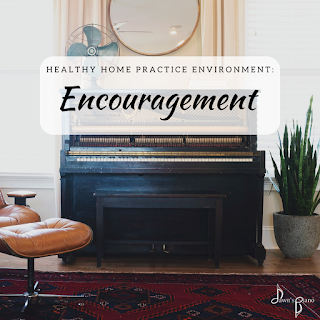Healthy Home Practice Environment Part 4: Encouragement
Today is the last week of our series all about setting up a Healthy Home Practice Environment, and I've saved a really important one. We're talking about encouragement. Piano kids work hard when they practice, and showing them that we recognize the work they are putting, and are proud of them for it, in is really important in inspiring them to keep it up.
One of the tricks about giving encouragement and feedback is to make sure that it is authentic. If your child played through a piece and it sounded like a train wreck, we don't want to say "that sounded really great!" because they have ears too and they know whether or not it did in fact sound great. If they get used to us using vague generalizations to protect their feelings, they won't be as ready to listen when we really have something valuable to say. At the same time, I know that non-musical parents may not always know exactly what to say to support their children during practice. So, today, I'm sharing some ways to be honest, uplifting and specific when we offer our piano kids encouragement during practice.
One of the tricks about giving encouragement and feedback is to make sure that it is authentic. If your child played through a piece and it sounded like a train wreck, we don't want to say "that sounded really great!" because they have ears too and they know whether or not it did in fact sound great. If they get used to us using vague generalizations to protect their feelings, they won't be as ready to listen when we really have something valuable to say. At the same time, I know that non-musical parents may not always know exactly what to say to support their children during practice. So, today, I'm sharing some ways to be honest, uplifting and specific when we offer our piano kids encouragement during practice.
- Be genuine, because as in my example, they know when we're not being entirely honest. Here are some alternate ideas to "that sounded great" for when you need to say something a little different.
- "I can tell you're working really hard on this one"
- "That's a challenging piece! I'm proud of you for taking it on"
- "I can hear the improvement from [yesterday/last week etc]"
- "You played that with lots of energy"
- Be specific. The easiest way is to choose a specific element of the music to comment on.
- "I could really hear the louder and softer parts"
- "The way you played so gently the beginning really made me feel your music"
- "You really nailed the ending that time!"
- "I can really feel that rhythm you've been working on"
- Be productive. Sometimes we can all use a nudge in the right direction of which parts to continue working on. This is often called constructive criticism, but since that gets a bad rap I'm going to call it productive encouragement.
- "That section in the middle sounds kind of tricky, can we work on it by itself a couple times?"
- "I think you got all the notes down, now where are the dynamics we can work on including?"
- "What do you think the song is about? How can we play it to make it feel like that a little more?"
- Be engaging. Whether you're working in the next room or sitting right next to the piano, engaging with your piano kid makes all the difference.
- Stick this list of 'Shout it out from the Kitchen' ideas from Teach Piano Today on your fridge for when you need some ideas of what to say from the next room.
- Brainstorm with your child who you could play a particular piece for once they've mastered it. "Let's call Grandma so you can play it for her!"
- "Can you show me the last note and when you get the end I'll play it?"
- "Can you teach me the beginning of that song, I really like how it sounds."
